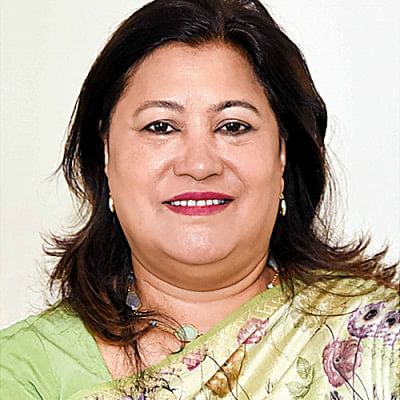Leading from the front in a pandemic

Rubana Huq
Managing director of Mohammadi Group
Assuring the workers that the company would be by their side and ensure their wellness was important to us. We have 15,000 employees.
Mostly we were focusing on the industrial relations because that is the key to boosting efficiency and productivity.
Also, we restructured our business a little bit because we tried running lesser hours since there were less work orders. Work orders in the woven segment are still at least 30 to 40 percent lesser than before.
Our major innovation since the outbreak of Covid-19 was basically engaging with the employees because that is the key for us.

At the same time, we tried our best to reduce our costs. To put it very simply, hard copies were reduced. Basically, we shifted to the virtual platform very quickly.
Cost reduction, and optimum labour and management efficiency were focused on.
Our employees were managed pretty well during the crisis. We did not carry out any salary cuts even for higher management. Many companies actually went for radical cost reductions and deducted salaries which we did not do.
So I think through these actions, we won the confidence of the staff and they are all esteemed and trusted colleagues who worked very hard during bad times.
I think gaining the trust and confidence of workers and making them feel respected—as equal partners in the organisation—probably set a better tone. I think business is all about relationships.
So, apart from our books and our ledger, I think what we need to concentrate on is human resources and that is the key.

Ayesha Aziz Khan
Managing director and CEO of Summit Power International
During the early stage, Summit made three crucial and bold decisions. Firstly, to keep the morale high among the employees, Summit announced that there would be no layoffs or salary reduction.
Secondly, for all the employees of Summit, procedures were set in place to help employees to work in isolation and maintain social distancing.
This ensured Summit's ability to manage full power generation for Bangladesh when the entire supply chain was at the brink of breakdown. Summit has been fortunate that no lives have been lost due to Covid-19 among its staff.
Thirdly, Summit supported the greater international communities and specifically Bangladeshi migrant workers in Singapore. Summit swiftly imported and installed thermal scanners at the international airport in Dhaka.
With joint initiatives with its international business partners, Summit procured personal protective gear and secured PCR machines for hospitals in Dhaka and Gopalganj. It also donated specialised ambulances to various hospitals.
Furthermore, two publicly listed companies of the group, Summit Power Ltd (SPL) and Summit Alliance Port Ltd (SAPL), announced and disbursed dividends without disruption. At the peak of the pandemic, when both Singapore and Bangladesh were under lockdown, Summit secured project financing of a total of USD 447 million for Summit LNG and Summit Meghnaghat II Power. This deal was awarded the "Best Deals of the Year in South Asia" in the Asset Triple 'A' Asia Infrastructure Awards 2020.

Farzana Chowdhury
Managing director of Green Delta Insurance Company
Considering the hardships of people, Green Delta Insurance worked throughout the year for the people. We started work-from-home in March 2020 as per government directive. We instructed our employees not to push clients for business. We advised them to rather support customers and be empathetic.
We did not stop serving the people, even though we were confined to our homes. We provided policy/cover extension to many of our clients to ensure that they can stay relaxed and renew their policies when it's safe. We also ensured claims payments with the assistance of technology and online banking facilities.
Amidst the pandemic, we have seen exponential growth in terms of innovation in products and services all over the world.
At this stage, people need insurance services, not insurance companies. Since innovation in products/services is key for sustainable and resilient business, during the pandemic we were able to come up with two exciting products.
We launched the "Covid-19 insurance" package during the pandemic whose sum ranges from Tk 50,000 to Tk 2,50,000.
We also introduced an artificial intelligence (AI) based mobile application "InsuMama" which is the first of its kind in the non-life insurance segment. It allows for instant account opening and policy purchase tools online.
We believe employees are the backbone of any business' success and that's why we have prioritised our staff and their physical, mental and financial wellbeing. We neither reduced the salary of our employees nor opted for layoffs.

Rupali Chowdhury
Managing director of Berger Paints Bangladesh Ltd
Customers, consumers and employees are the three main pivots of our business who continued to support and partner with us during the pandemic.
This synergy actually helped Berger not just survive but also grow significantly during the Covid period. Berger Paints Bangladesh Limited has come forward with a number of initiatives to aid painters and dealers during this crisis. The company has provided emergency fund assistance of more than Tk 2 crore to 20,000 painters nationwide.
Additionally, Berger Paints has collaborated with Digital Health Services,Tonic, to provide digital health services to valued members (painters) of the 'Shomporko Club'. The company has been relentlessly working with painters in rural areas across the country to bring them under the new health benefits coverage.
Besides, all non-cash benefits from the earlier promotional scheme of the company were converted, and the monetary value was transferred to the painters and dealers through the mobile financial system (MFS).
We customised our painting services considering this pandemic and began offering complete safe painting services to the consumers – ensuring six-step protective measures for Berger Experience Zone colour consultants and painters.
We also launched Berger Expert Sanitization services under which our team members will periodically sanitise customers' places, be it their homes or workplace. Keeping up with the new demand, we have also launched Berger Breathe Easy Viracare.

Shwapna Bhowmick
Country manager of British retail giant Marks & Spencer (M&S)
M&S has a great culture of updating its business strategy through continuous learning and feedback at every level. We have a good prediction analysis, thanks to which it had taken much lesser time to adapt to the financial risks.
Business Continuity Plan (BCP) is a regular, practised way of our business. After March 2020, we implemented the BCP. People have been given adequate technological support and medical guidelines to manage our day-to-day jobs.
Our communication was clear across our entire supply chain about our strategy to safeguard our business that eventually saved our vendors' bread and butter too.
The cut-off time was set to account for liability with its settlement plan over the period of the pandemic. While stores were closed, we focused on investing in online channels.
Since we had to abandon travels, we invested on the digital fit technology.
On the sourcing side, we embraced the consultation process at the UK stores to adjust our fixed cost pressure points, keeping the bottom lines still needed for survival.
M&S believes in sustainable partnerships, and as such we have given equal priority to our customers by enabling more online channels and offering more home-friendly products.
Motivated by the slogan "Never the same again", we have gone the extra mile wherever possible in the process. Home-office friendly product mixes – PJs, sleepwear, etc. – are now our hot-selling products.

 For all latest news, follow The Daily Star's Google News channel.
For all latest news, follow The Daily Star's Google News channel. 



Comments